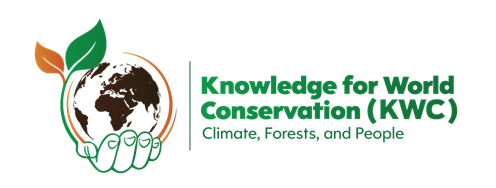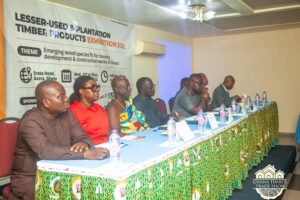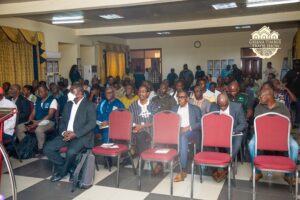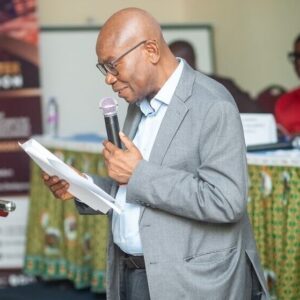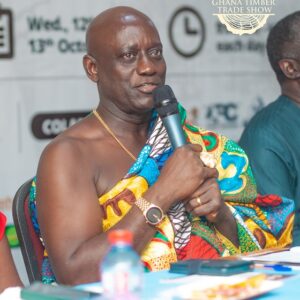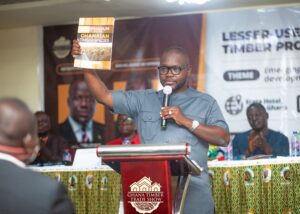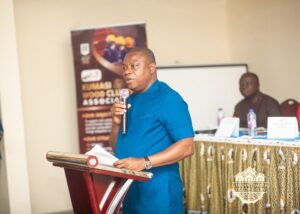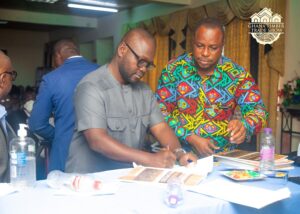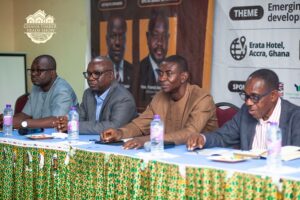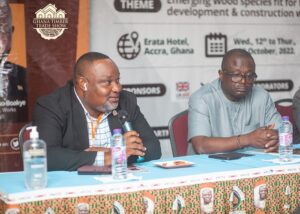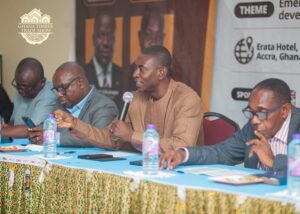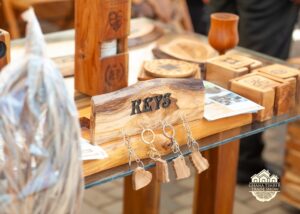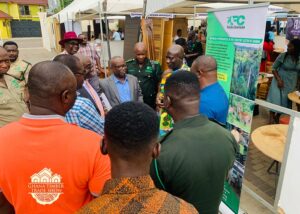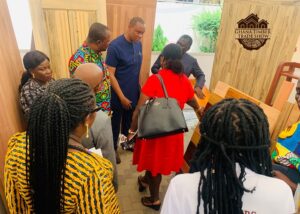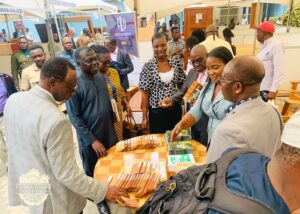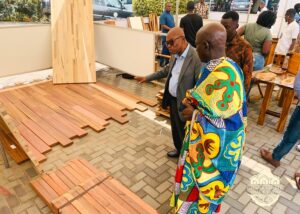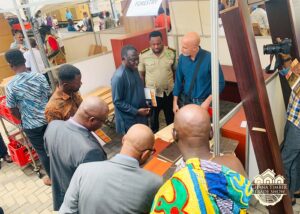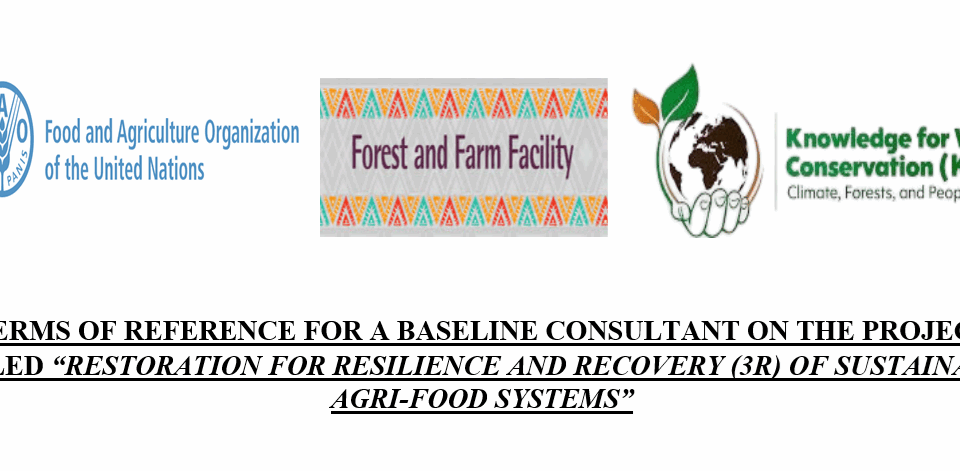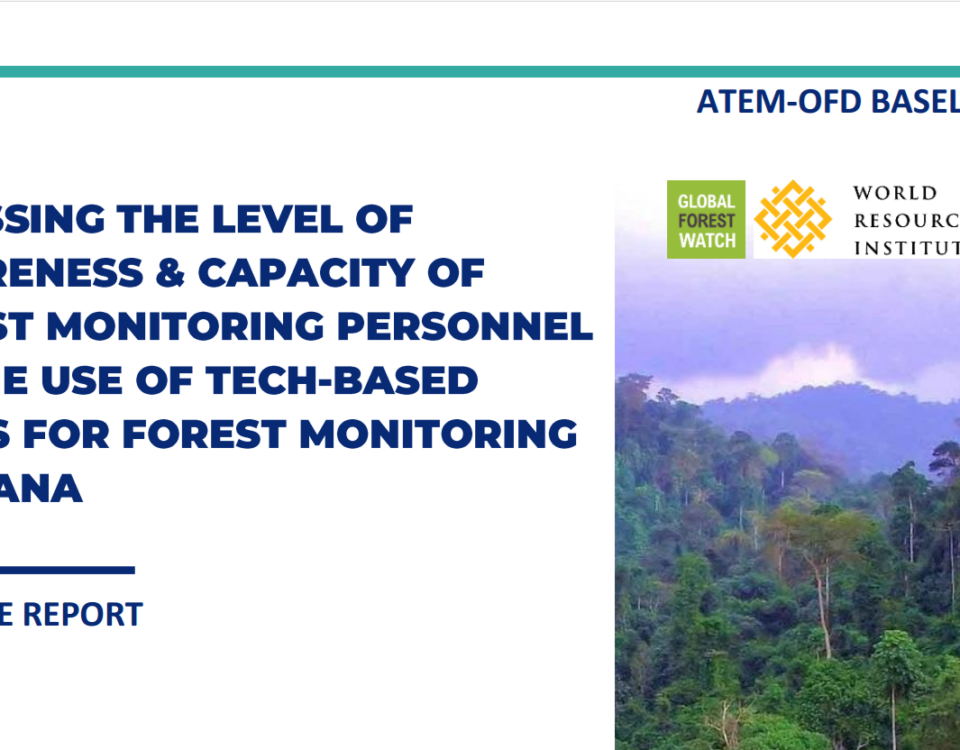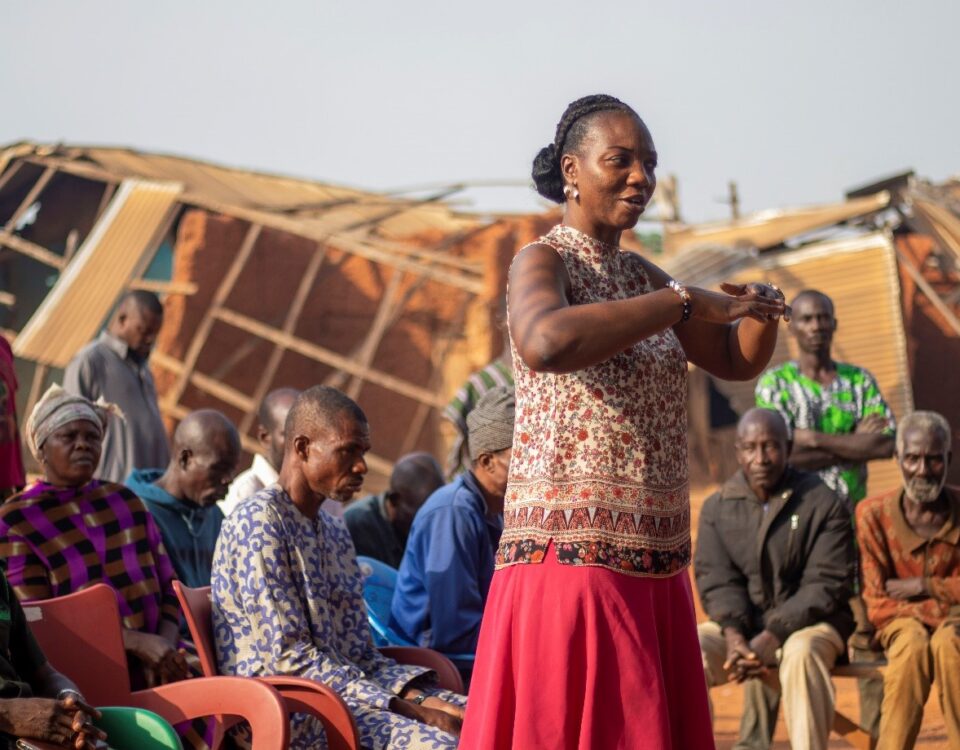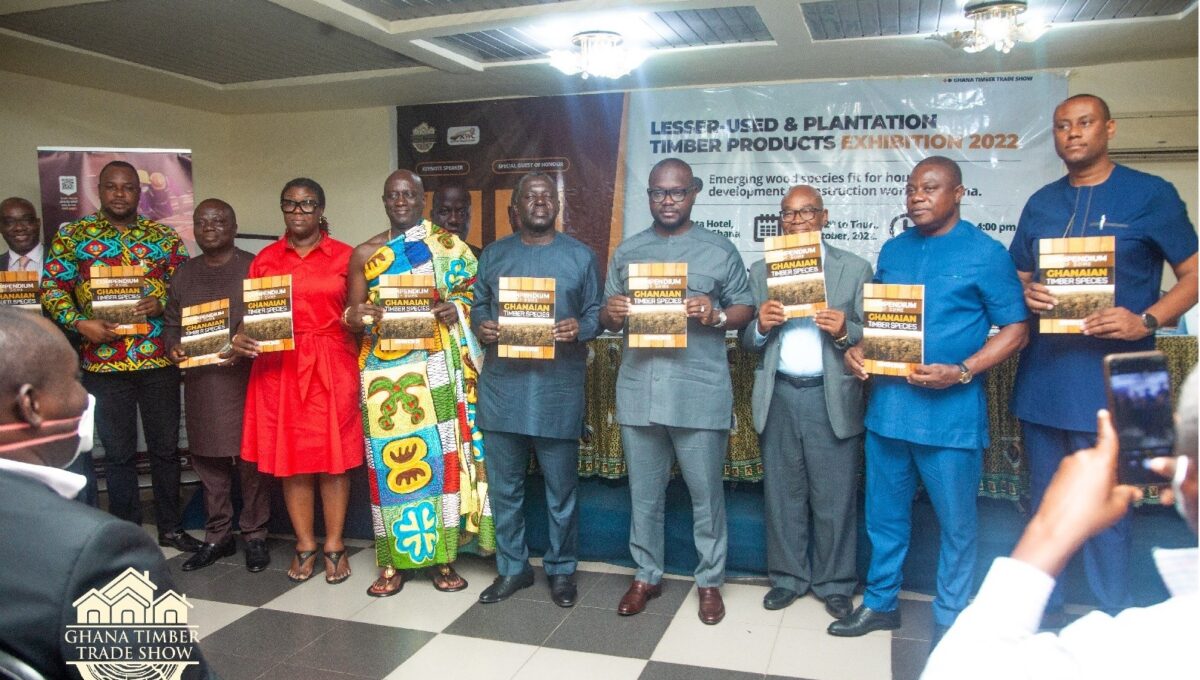
On the 12-13 October, 2022, the Kumasi Wood Cluster Association, the Timber Industry Development Division of the Forestry Commission and the Ghana Chamber of Construction Industry, supported by the UKaid and UKTTF, organized the foremost timber exhibition event, in recent times, on the theme: "Emerging wood species fit for housing development and construction works in Ghana".
Overview
Over the years, Ghana’s timber supply chain has largely been filled with approximately 14% of the 715 tree species in the forests. The commonly known species among these have been over-exploited. As a result, their availability has dwindled. Research has however shown that other (emerging) timber species with comparable physical and technical properties which may be lesser known species (LKS) or lesser used species (LUS) and plantation timber are available in appreciable commercial quantities.
The adoption of the alternative timbers, despite their potential to protect our forests by diverting demand pressure away from the few commonly used timber species, is in question because the domestic market is not adequately aware and capacitated to use them.
Consequently, the Kumasi Wood Cluster Association, through the project called “Building the capacities of Small-Medium Forest Enterprises in Ghana and Liberia to supply and Trade in Legal Timber (Phase 1 and Phase II)”, funded by the UKaid, has actively embarked on capacity development and awareness creation initiatives geared towards promoting the domestic use of lesser-used and plantation timber species.
Among such initiatives, include publishing a Compendium on some timber species in Ghana. The compendium disseminates physical and technical information about LUS/LKS timber species in an easy to read manner to facilitate easy and effective knowledge uptake and application by wood users.
KWC has also developed the GhTimber Atlas, a dynamic mobile application that offers a visual and graphical approach to understanding the physical and technical properties of some Ghanaian timber species. The development of these resources and tools have been followed by a series of in-person engagements with actors within domestic timber supply chain, particularly high volume timber consumers, most of who are in the Ghana Chamber of Construction Industry (GhCCI), in order to create the necessary awareness for adoption of lesser-used and plantation timber.
Beyond these initiatives, there was a strong need to undertake an exhibition of products made out of lesser-used and plantation timber. The exhibition would not only serve another opportunity promoting lesser-used and lesser-known timber species, but also, let wood consumers and the public ‘see and feel’ the quality of products that can be made out of lesser-used and plantation timber.
The Lesser-used and plantation timber exhibition 2022
In collaboration with the Timber Industry Development Division (TIDD) of the Forestry Commission and the Ghana Chamber of Construction Industry (GhCCI), KWC organized the Lesser-used and Plantation Timber Products Exhibition 2022. The event happened to be the foremost timber trade show, in recent times, dedicated to promoting lesser-used timber and plantation species in Ghana. .
The exhibition reflected deepest commitment of KWC, its collaborators as well as funding partners, to ensure wholesale adoption of lesser-used and plantation timber species as suitable and sustainable alternatives to the commonly used and often over-exploited timber species such as Mahogany, Wawa, Sapele, Kokrodua, Odum etc. for building and construction.
It was a 2-day event held at the Erata Hotel, Accra. Funding for the exhibition was primarily provided by the UKaid through the Building the capacities of Small-Medium Forest Enterprises in Ghana and Liberia to supply and Trade in Legal Timber project, as part of the FGMC Programme. The UK Timber Trade Federation (UKTTF) also supported the initiative with additional funding to facilitate the mobilization of the resources and logistics critical to the success of the exhibition.
Pre-event TV interview
On 11 October, 2022, Executive Director for KWC, Mr. Gustav Adu, and the Operations Director of the Timber Industry Development (TIDD) of the Forestry Commission of Ghana, Mr. Peter Zomelo, were hosted on the morning show of GhOneTV (one of the television channels in Ghana with nationwide coverage) to discuss emerging wood species and impact on sustainable wood supply and the environment.
Among other issues discussed, they were able to paint a picture of the impact of the over-exploitation of these species on the environment and livelihoods of people who depend on forest products. The place of lesser-used and plantation timber in ensuring sustainable wood supply for infrastructural development was also discussed including measures in place to ensure sustainable availability of these emerging species for wood consumers.
Mr. Gustav Adu seized opportunity to announce and invite stakeholders in the built industry as well as the public to participate in the 2-day exhibition for lesser-used and plantation timber.
The Two-Day Event
The event was segmented into three main parts; the opening ceremony, a mini-conference and the exhibition. The trade show was remarkably well-attended, because of the publicity effort prior to the event and the fact that this was a free event. Participants included architects, estate developers, timber suppliers, plantation developers, researchers, policy makers, road and building contractors, surveyors, other specifiers, wood processors, traders as well as the public.
Representatives of stakeholder agencies and organizations like Forest Industries Association of Ghana (FIAG) and other timber trade associations, Ghana Chamber of Construction Industry (GhCCI), Forest Research Institute of Ghana (FORIG) of the Council for Scientific and Industrial Research (CSIR), THE Forestry Commission, Ministry of Lands and Natural Resources, Ministry of Works and Housing and the Ministry of Local Government actively participated in the two-day event. The Liberian Timber Association (LIBTA) also sent a high powered delegation that actively participated in the exhibition proceedings and picked up key planning and operational lessons for future replication in Liberia.
"Efforts are being made to provide abundant and reliable information on these species using evidence-based research on wood properties coupled with demonstrations of their applications such as this very exhibition that has been organized."
- Mr. Benito Owusu-Bio, Deputy Minister for Lands and Natural Resources, in charge of Forestry.
The Opening Ceremony
Among the invited guests in attendance included; Tetrete Okuamoah Sekyim II, the paramount chief of Wassa Amenfi and the Chairman of the Forestry Commission Board, Mr. John Allotey, Chief Executive Officer of Ghana’s Forestry Commission, Hon. Francis Assenso-Boakye, Minister of Works and Housing, Hon. Benito Owusu Bio, Deputy Minister of Lands and Natural Resources.
Also in attendance were some of members of the Forestry Commission Board including Nana Akosua Agyemang Prempeh and Mr. George Wireko-Brobby. Others were Surveyor Emmanuel Martey, Chairman of the GhCCI Council and Mr. Emmanuel Cherry, Chief Executive Officer of the GhCCI.
The opening ceremony was chaired by Tetrete Okuamoah Sekyim II, the paramount chief of Wassa Amenfi and the Chairman of the Forestry Commission Board. In his welcome address, the Executive Director of KWC and a Board Member of the FC, Mr. Gustav Adu, said the event is being organized primarily to serve as a business and networking platform that connects suppliers of lesser-used and plantation timber and timber products to consumers, especially the high volume timber consumers in Ghana.
He explained that, timber has been one of the fundamental resources for infrastructure and housing development in Ghana and that despite its apparent scarcity, the availability of alternative timber species with comparable physical and technical properties have been variously documented for utilization. Thus, wood consumers, through the event, will “see and feel” the quality of products made from selected plantation and lesser-used timber species.
The Chief Executive of the Forestry Commission, Mr. John Allotey indicated that the lesser-used wood species promotion is one of the Forestry Commission’s initiatives to combat illegal logging and achieve the environmental objectives of sustainable forest management (SFM) while transforming the domestic marketplace into an industrial hub for value added processing. “The initiation of promoting commercial exploitation and the use of LUS and plantation timber in construction is therefore expected to enhance the availability and supply of legal timber particularly for the domestic market”, he stated.
He further added that; the increase in demand for timber as a raw material for construction particularly in the real estate sector, puts a lot of pressure on forest reserves. Ghanaians and consumers of timber all over the world have a high taste for traditional tropical timber species such as Mahogany, Odum, Dahoma, Sapele, Masonia which are becoming scarce because of over-exploitation. To avoid complete extinction of these prime species and its consequent ecological imbalance, there is the need to shift attention from these few prime species by exploring the market potential of other timber species that may be of economic value.
Mr. Allotey enumerated a number of policy interventions that the Forestry Commission has introduced to ensure adequate supply of legal timber on the domestic market among which include:
- Implementation of Domestic Market Policy, which aims at improving legality on the domestic market.
- Development of Public Procurement Policy on Timber and Timber Products to provide policy prescriptions for the purchase of timber and timber products by central government.
- Introduction of procedural guidance that will facilitate the enforcement of removal of 100% of allocated yield of timber right holders.
- Introduction of a new legislation, LI 2254 in 2017, which gives legal backing to the Voluntary Partnership Agreement(VPA) implementation and provide further measures to ensure the legality of timber not only for the export market but also for the domestic market.
Hon. Francis Asenso-Boakye, the Minister for Works and Housing and the Special Guest of Honour of the event, expressed his excitement about the collaboration efforts between civil society organizations such as KWC and the Forestry Commission to organize the exhibition, which primarily has the interest of the works and housing sector in focus, while saving the environment.
He buttressed on the importance of LUS in the housing sector. Given the current over exploitation of timber, the knowledge about LUS will help reduce pressure on the well-known species and provide the housing sector several alternatives for construction purposes.
The Hon. Francis Asenso-Boakye also took the opportunity to launch the book titled “Compendium of some Ghanaian Timber Species” and a mobile app called “GhTimber Atlas” which are free resources developed by KWC to display the lesser-used and lesser-known timber species. The reference sources provide the names, appearances, geographical locations the species naturally occur, mechanical properties, and products that could be made out of the species.
The Deputy Minister for Lands and Natural Resources, in charge of Forestry, Hon. Benito Owusu-Bio, represented the Minister, Hon. Samuel Abu Jinapor as the Keynote Speaker. He commended the organisers for seeking to throw more light on the lesser used species that can be used in place of well-known timber species.
Mr. Owusu-Bio continued to say that Ghana is blessed with abundant LUS that offer similar aesthetic appeal and perform just as well as many species that are already highly sought after in the marketplace. In the past the biggest problem related to promoting LUS has been the lack of information on their realistic mechanical properties.
He further noted that, “efforts are being made to provide abundant and reliable information on these species using evidence-based research on wood properties coupled with demonstrations of their applications such as this very exhibition that has been organized.
He added that the importance of this event is very critical as we need to bridge the knowledge gap between the use of the LUS and the traditional timber species. “We need to kick-start a drive for the commercial usage of LUS particular”, he said. He duly opened the exhibition for viewing. The invited guests and participants were then ushered to the exhibition area to interact with the exhibitors and critically assess their products.
The conference
After the opening ceremony, participants reconvened for a panel discussion under the theme “Forest sector support for the development of housing and construction”. A panel of five discussants were constituted to speak to topical issues such as the outlook of timber availability to meet current and future housing and construction needs; mobilizing wood for construction and housing development as well as green affordable housing and sustainable timber supply.
Panelists included; Mr. Yaw Atuahene Nyarko (Production Manager, Resource Management Support Centre of FC), Mr. Peter Zormelo (Operations Director, Timber Industry Development Division of FC), and Dr. Emmanuel Appiah-Kubi (Senior Lecturer, Department of Construction and Wood Technology, Akenten Appiah Minkah University of Skills Training & Entrepreneurial Development). Other panelists who represented industry players included Mr. Samuel David K. Amegayibor (Ghana Real Estates Developers Association, GhCCI) and Dr. Kwame Asamoah Adam (Chief Executive Officer, Forest Industries Association of Ghana).
Panelists further discussed issues on the conducive policy and economic environment for the promotion of lesser-used plantation timber for housing development, and policy direction on utilization of LUS and plantation timber. Among the key take-aways from the panel discussion are;
- Continuous awareness creation on the availability and suitability of alternative timber species for adoption by timber consumers and the public.
- An assessment of the current availability of the lesser-used wood species and their sustainability for the planning and usage of timber.
- Capacity development for domestic wood processors along the supply chain, especially small and medium enterprises, on the appropriate treatment and processing technologies for lesser-used and plantation timber species to meet specified standards for utilization.
- Plantation timbers have overtaken naturally occurring timber in terms of volume as the main source of timber for export. Looking ahead therefore, the Government, industry and other stakeholders must facilitate private sector involvement in more plantation development and urgently promote domestic use processing of plantation timber and their use.
- Presently, there is no clear-cut policy or consideration on the use of lesser-used and plantation timber for public works. In order to make the adoption of alternative timber species effective, government, through the Ministries of Works and Housing as well as the Lands and Natural Resources and Local Government, must formulate or revise existing building codes and cross-sectoral procurement policies, such as specifying proportions of local content of building materials, to incentivize or enforce the use of timber from lesser-used species for public works, by contractors.
- More platforms should be created to connect high volume wood consumers, such as the GhCCI, with suppliers of lesser-used and plantation timber species. Easy access to credible and reliable suppliers will facilitate adoption and promote the use of legal timber in the domestic market.
- Further, an orientation and training on how to access and use the Compendium of Some Selected Ghanaian Timber Species, the GhTimber Atlas app and the Domestic Wood Tracking System app was conducted by KWC and the TIDD. Exhibitors were also given opportunity to speak to the products and services they offer and to establish business to business connections with participants.
Participants at the conference were given orientation and training to use the "Compendium of Some Selected Ghanaian Timber Species, and the GhTimber Atlas app as well as the Domestic Wood Tracking System app by KWC and TIDD. Exhibitors were also given time and opportunity to speak to and promote the products and services they offer and to establish business to business connections with participants.
The exhibition
The exhibition was organized each day from 12-13 October, 2022 from 9am – 16:30 GMT. Ten (10) companies that harvested and processed LUS and plantation timber into semi-finished and finished products to exhibit were; Samartex Timber and Plywood Ltd., Logs and Lumber Ltd., John Bitar Company Ltd., Xylogi and Xyloworks Ltd.,Ayipah Wood Processing Ltd., Miro Forestry Ltd., Form Ghana Limited, Specialized Timber Products Ltd. and the Private Afforestation Developers Association (PADO).
Fifteen (15) other companies including Modern Wood Technologies, White Eagle Company Ltd., MOFCO Furniture Co. Ltd., Pilot Institute Technologies, 2BEEZ Arts, Forestry Commission Training Centre (FCTC), Chaka Construction Ltd., Climax Deco Ltd., Liberty Furniture Ltd., Saturn Complex Ltd., Innovatec Ghana Ltd., Bamboo Ecocity, Modern Wood Company Ltd, Artworks Ghana Ltd. and Furnat Ghana Ltd. used the LUS and plantation timber to produce finished products to exhibit.
The companies were drawn from from the Northern, Western, Southern and Eastern parts of Ghana. A wide variety of wood products made from LUS and plantation timber were exhibited including; different types of furniture (dining sets, tables, chairs, lazy chairs, poolside beds), panel and flash doors, door and window and frames, pallets, carvings and artifacts, decking and flooring, heavy duty stakes and poles, planter boxes, mini-bar set, planks and boards, processed and unprocessed samples of the timber species.
Overall, exhibits were made from the following timber species; Akata – Rhodognaphalon buonopozense, Cederella Odorata, Danta – Nesogordonia papaverifera, Denya – Cylicodiscus gabunensis , Esa - Celtis spp, Ohaa - Sterculia oblonga, Kroma – Klainedoxa gabonensis, Watapuo – Cola gigantea, Yaya - Amphimas pterocarpoides, Teak – Tectonia grandis, and Eucalyptus spp.
Report by
KWC & TIDD
